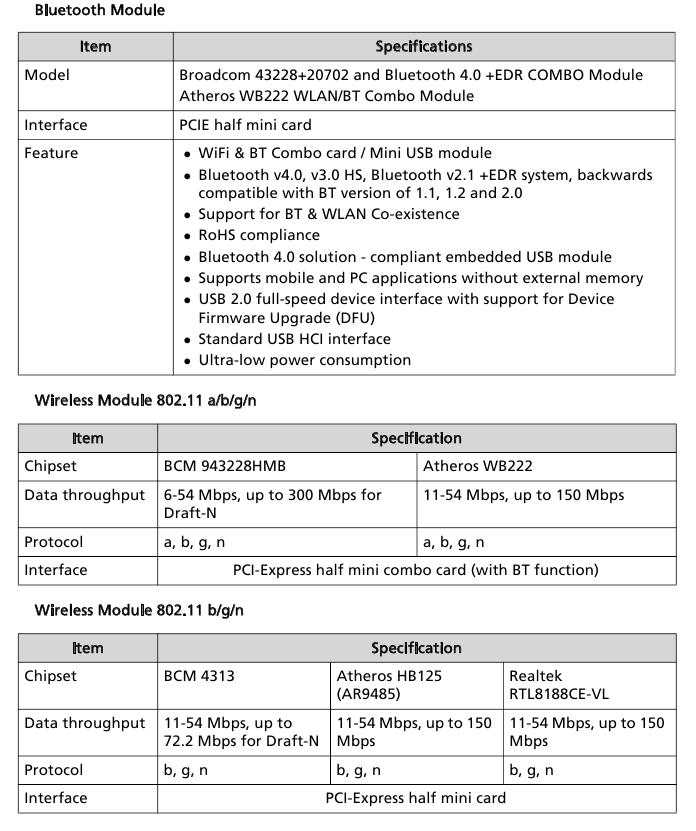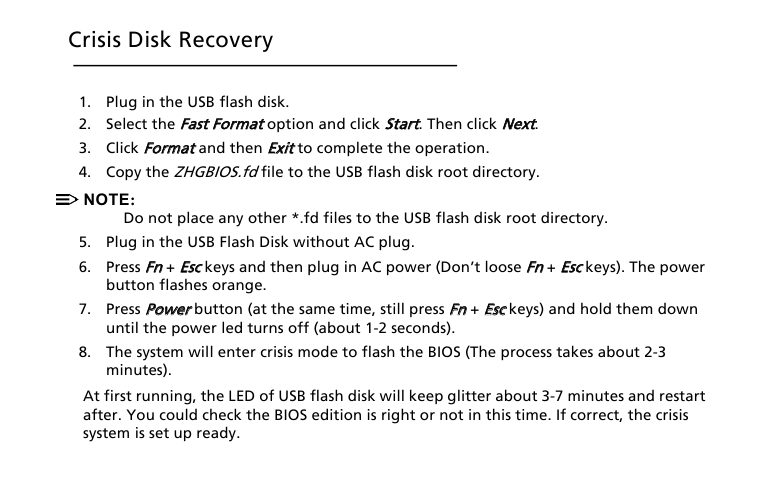Modding the AO725
1. The HDD has been replaced with a
Western Digital WD5000BPKT
2. The wireless card has been replaced with an Atheros AR9485 with ID 168c:0032
3. The bios version 2.04 has been unlocked
Follow this instructions to replace the HDD and the Wireless module
This netbook has a BIOS provided by InsydeH2O. This software has a limited set of options and, probably, a whitelist for a set of allowed wireless card.
In the service manual I have found the list of wireless card used in all variants of this model

It is possible to use a wireless card with a bluetooth module if needed. My choice has been for an Atheros HB125.
After the replacement the Wifi card, I see that LED is working also on Linux
The CPU mounted is an APU C-70 who supports the SVM feature, required by KVM kernel module (used to have a full virtualization support).
Unfortunately the BIOS disable svm by default and there aren't no options to enable it.
For the details about the unlocking see this thread http://www.bios-mods.com/forum/Thread-UNLOCKED-Unlocking-amd-v-for-Aspire-AO725?pid=52813#pid52813
You can download the modded bios (v2.04) here
The procedure to flash the BIOS is described in the service manual

After the upgrade, two new menus are accessible: "advanced" and "power"
Don't worry if you get a warning when enter in the "Advanced -> Video Configuration" menu
In the Power menu the "Thermal Fan Control" must be leaved unchanged (disabled by default)
SVM Support option is available in the "Advanced -> CPU Related setting" menu
Contact Information, any tips are welcome
2. The wireless card has been replaced with an Atheros AR9485 with ID 168c:0032
3. The bios version 2.04 has been unlocked
Follow this instructions to replace the HDD and the Wireless module
This netbook has a BIOS provided by InsydeH2O. This software has a limited set of options and, probably, a whitelist for a set of allowed wireless card.
In the service manual I have found the list of wireless card used in all variants of this model

It is possible to use a wireless card with a bluetooth module if needed. My choice has been for an Atheros HB125.
After the replacement the Wifi card, I see that LED is working also on Linux
The CPU mounted is an APU C-70 who supports the SVM feature, required by KVM kernel module (used to have a full virtualization support).
Unfortunately the BIOS disable svm by default and there aren't no options to enable it.
For the details about the unlocking see this thread http://www.bios-mods.com/forum/Thread-UNLOCKED-Unlocking-amd-v-for-Aspire-AO725?pid=52813#pid52813
You can download the modded bios (v2.04) here
The procedure to flash the BIOS is described in the service manual

After the upgrade, two new menus are accessible: "advanced" and "power"
Don't worry if you get a warning when enter in the "Advanced -> Video Configuration" menu
In the Power menu the "Thermal Fan Control" must be leaved unchanged (disabled by default)
SVM Support option is available in the "Advanced -> CPU Related setting" menu
Contact Information, any tips are welcome
- AlexKidd [at] altervista [dot] org
Links
- The explanation about the modding of this BIOS http://www.bios-mods.com/forum/Thread-UNLOCKED-Unlocking-amd-v-for-Aspire-AO725?pid=52813#pid52813
Other useful links